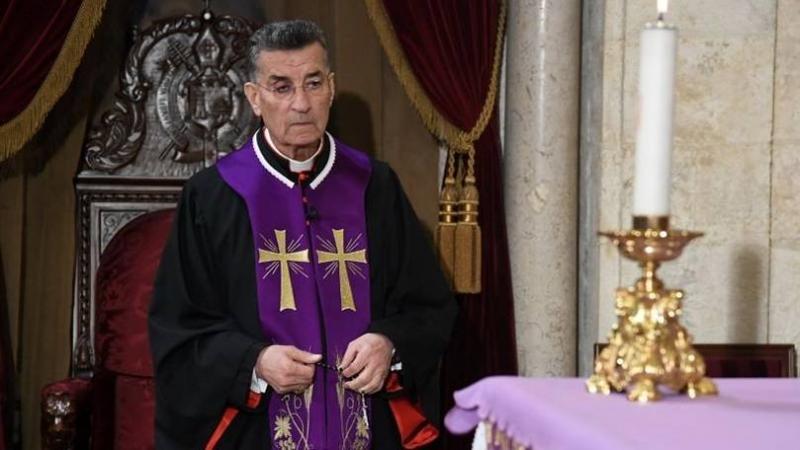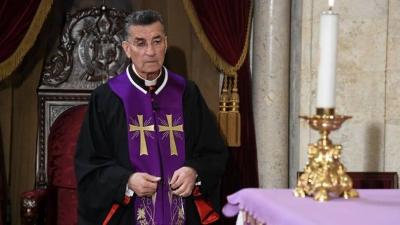Cardinal Mar Bechara Boutros Al-Rahi, the Maronite Patriarch, presided over the sixth Sunday of Pentecost mass at the summer patriarchal residence in Dimane, assisted by Bishop Hanna Alwan, the patriarchal steward Father Tony Al-Agha, Father Fadi Tabet, and a number of priests, in the presence of a congregation of believers.
After the Gospel, he delivered a sermon titled "Behold, I send you out as sheep among wolves" (Matthew 10:16), stating: "The Church, with its sons and daughters and institutions, is sent to spread the Kingdom of God in the world. For this reason, it faces rejection and persecution, as the Lord Jesus warns in the Gospel of this Sunday. He likens the disseminators of God's Kingdom in human society to sheep, and the rejectors of its values and those who spread them to wolves. Since the values of God's Kingdom are: truth, which is rejected by liars and deceivers; justice, which is rejected by the oppressors; peace, which is rejected by the princes of strife and war; love, which is rejected by the hateful; and freedom, which is rejected by the enslaved. In light of this reality, the Church must not be afraid or retreat. 'The right hand of the Lord, which He has planted, is the one that nurtures, protects, and guides it with the light of the Holy Spirit' (see Psalm 80:15; Matthew 10:19-20)."
He added: "It brings us joy to celebrate this divine liturgy together, and we ask God to enrich us with the wisdom of life, the gentleness of doves, and patience. With wisdom, we avoid the evil of the wicked and remain cautious of them. With gentleness, we persevere in faith and hope, and do not succumb to negative reactions. With patience, we ensure victory: 'He who endures to the end will be saved' (Matthew 10:22). Our Lord Jesus calls us to stand firm in the face of persecution and to keep Him before us, He who accepted suffering, persecution, and death on the cross for the salvation of the world. And when He says, 'A disciple is not above his teacher' (Matthew 10:24), He means that our sufferings are an extension of His redemptive sufferings and a sharing in them."
He continued: "I greet you all, and extend a special greeting to the family of the late Albert George Tanouri, whom we bid farewell to with his wife, sons, daughter, and relatives a week ago in Dekoueneh. We renew our heartfelt condolences to his family and remember him in this divine sacrifice, asking God for him a happy rest in heaven, and consolation for his family. We also welcome our dear Michael Haddad, the goodwill ambassador for the United Nations Development Program. He undertook a five-day journey with his crutches in the heights of Norway, where he planted 'a bundle of seeds of hope.' He began his journey on June 2nd after receiving the blessing of His Holiness Pope Francis. It is known that our dear Michael suffered paralysis at the age of six due to a car accident, but he overcame his paralysis through sheer will, serving as an example for all of us."
He said: "The Church celebrates today the feast of the three martyr brothers from the Masabki family, who were Maronite merchants in Damascus. They were killed during the events of 1860 in the Maronite cathedral in Damascus, along with some Franciscan fathers and several Christians from Syria and Lebanon. We addressed our bishops' synod in the last session in June, asking His Holiness Pope Francis to order the process of their canonization to proceed. We seek their intercession in these challenging circumstances. Our Muslim brothers celebrate the blessed Eid al-Adha today, and we congratulate them on the occasion, asking God to make it a season of goodness and heavenly blessings upon them all in Lebanon and the world."
He added: "As long as the spirit of the Gospel, with its teachings, values, and spirituality, has not penetrated deeply into the hearts of every human being, conflicts, persecutions, assaults, and wars will continue to escalate, as we see in our Eastern environment, and as we see in Ukraine. This even reaches the core of the family (see verse 21). It also leads to the persecution of believers in Christ simply because they are Christians (see verse 22). The root of all these issues lies in ignorance of heavenly matters. When the martyrs cried out with their faith in Christ under the blows of the persecutors, they opened the door for these persecutors to believe in Him. Upholding the values of the Kingdom of God is essential in wielding power and political action. Herein lies our problems in Lebanon, of which we mention three."
He continued: "The first problem is the continued evasion and indifference regarding the formation of a government. The failure to facilitate the formation of a new government with full constitutional powers, which enjoys national, political, and chartered representation, is indeed a destructive act. Leaving the country without a government at the end of a term and on the eve of a presidential entitlement inevitably weakens the representative quality of Lebanese legitimacy as a national reference for negotiating with the international community. Thus, the forces of facts on the ground control national decision-making and the fate of Lebanon. This would increase the collapse of the state and the anger of the people, and would allow the conflicts and settlements of the region to take place at Lebanon's expense, as has been customary in recent decades. We also reject, together with our people, the manipulation of the presidential entitlement. We insist on the necessity of respecting this entitlement in its constitutional time and electing an experienced political leader who is respectful, brave, and disinterested, a neutral statesman in integrity, and committed to his nationalism. Above the alignments and axes and parties, he should not pose a challenge to anyone and should be able to exercise the role of the national, constitutional, and moral reference, and to gather the disputants to initiate putting the country on the path of genuine rescue and positive change. The circumstances of the country necessitate that this president be elected at the beginning of the constitutional period, not at its end, so that the people are reassured, souls find peace, and hopes are rejuvenated."
He said: "The second problem is the ongoing negotiations regarding the maritime border demarcation between Lebanon and Israel, so that Lebanon can extract promised oil and gas resources without any diminishment of our clear rights since the establishment of Greater Lebanon. The success of these negotiations primarily depends on the strength of the unity of the Lebanese stance behind legality and on avoiding any disruptions that could lead to failure in an extremely delicate context. The state cannot negotiate while others are testing the negotiations militarily. Despite the international reassurances we receive, no one can predict whether the region is on the verge of military or peaceful events; however, it is certainly on the brink of certain developments. Therefore, the higher interest of Lebanon demands that the border negotiations be neutralized from political games, internal entitlements, and regional conflicts; it is time for all parties to rally around the interest of Lebanon."
He added: "The third problem is electricity. It is possible to ensure production for up to ten hours daily before establishing power plants, as we understand from relevant ministry sources. This requires three things: securing fuel, especially from Egypt and Algeria, raising the tariffs to match the costs, and comprehensive and accurate billing. All of this requires political consensus and support from all sides, especially to guarantee comprehensive billing and just distribution."
He concluded: "It is a cause for hope and joy that Lebanese people from various countries of the diaspora come in large numbers to spend the summer in the lands of Lebanon, despite the precarious situation our country is going through and the daily life challenges. This demonstrates the people's attachment to their homeland in all circumstances, whether sweet or bitter. We hope that the recent wave of emigration will be temporary and that the new emigrants will return to Lebanon as soon as economic conditions improve and a new national dawn emerges soon. Indeed, the dawn must rise over this patient, steadfast, and eager people to rebuild their homeland. Yes, Lebanon will regain its sun, the one we used to say never sets due to the widespread presence of its children across various continents of the universe."




